#hideji ôtaki
Text
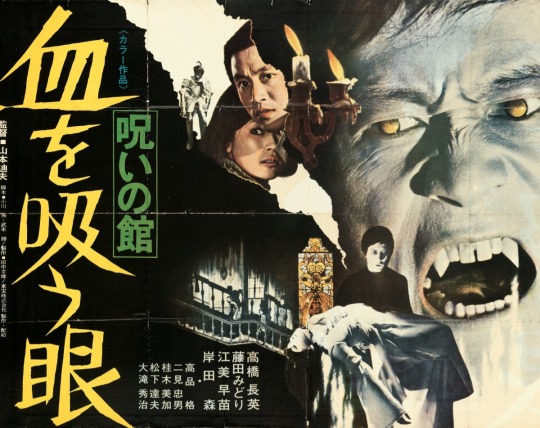
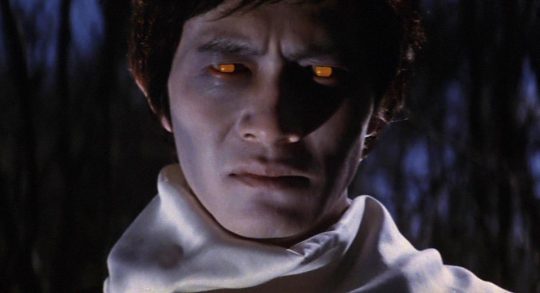
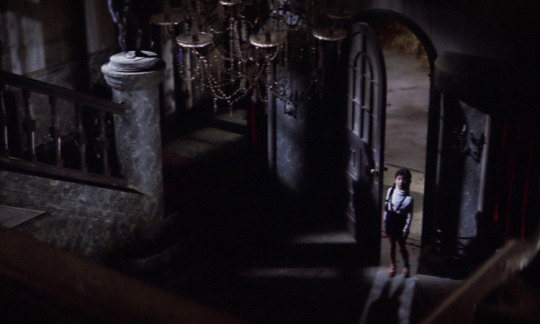
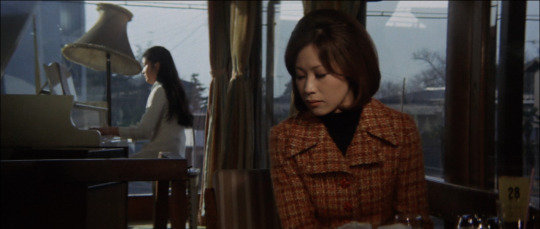
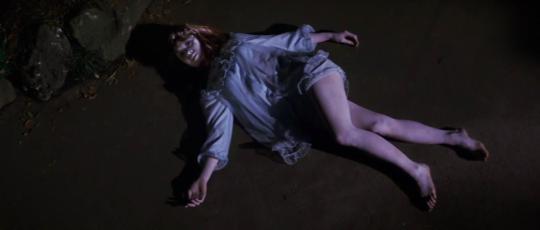
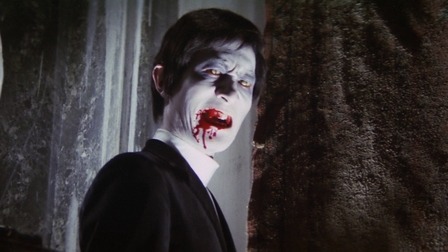
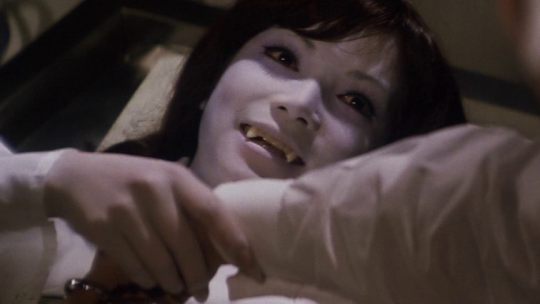
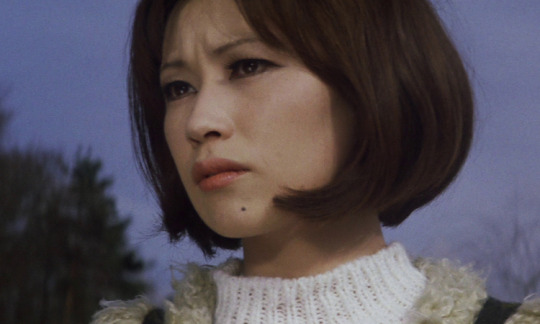

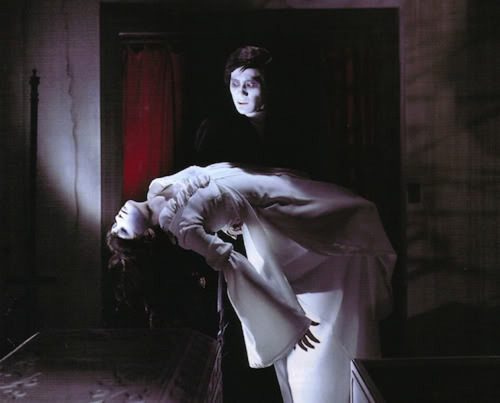
Noroi no yakata: Chi o suu me (Lake of Dracula, 1971)
"Kyusaku... why did you do that to me yesterday?"
"What do you mean, Miss? What did I do?"
"Who was the stranger I saw here the night before? Who was it?"
"My master."
"Master? But I know your master well."
"He's changed."
#Noroi no yakata: Chi o suu me#lake of dracula#bloodthirsty eyes#horror imagery tw#blood tw#japanese cinema#dracinema#1971#michio yamamoto#midori fujita#ei ogawa#masaru takesue#sanae emi#chôei takahashi#shin kishida#tadao futami#kaku takashina#hideji ôtaki#setsuko kawaguchi#mika katsuragi#fusako tachibana#the second in a loose trilogy of vampire films Yamamoto made in the early 70s‚ with clear influence from western cinema as much as from#japanese folklore; consider perhaps as a japanese take on Hammer horror‚ complete with bright red blood splatter and 70s fashions#the previous film‚ The Vampire Doll‚ was perhaps more successful in marrying gothic romance with contemporary horror than this film is#but it's still a very fun time. there are a few plot bumps (the bf figure switches between believing in vampires and not believing in them#apparently at random) but the fx are impressively stylish and the vampire's look fascinatingly horrible. plus there's a happy little dog#and what film isn't immediately made better by the presence of a happy little dog? no film‚ that's what
10 notes
·
View notes
Text
The Gentle Art of Japanese Extortion (1992)
The Gentle Art of Japanese Extortion by #JuzoItami starring #NobukoMiyamoto, "too uncomplicated a plot to justify its length"
JUZO ITAMI
Bil’s rating (out of 5): BBB.5
Original Title: Minbô no onna
Japan, 1992. Itami Films, Toho Company. Screenplay by Jûzô Itami. Cinematography by Yonezô Maeda. Produced by Seigo Hosogoe, Yasushi Tamaoki. Music by Toshiyuki Honda. Production Design by Shûshi Nakamura. Film Editing by Akira Suzuki.
The outsized exuberance of Juzo Itami’s exciting and incorrigible plots led to life being…
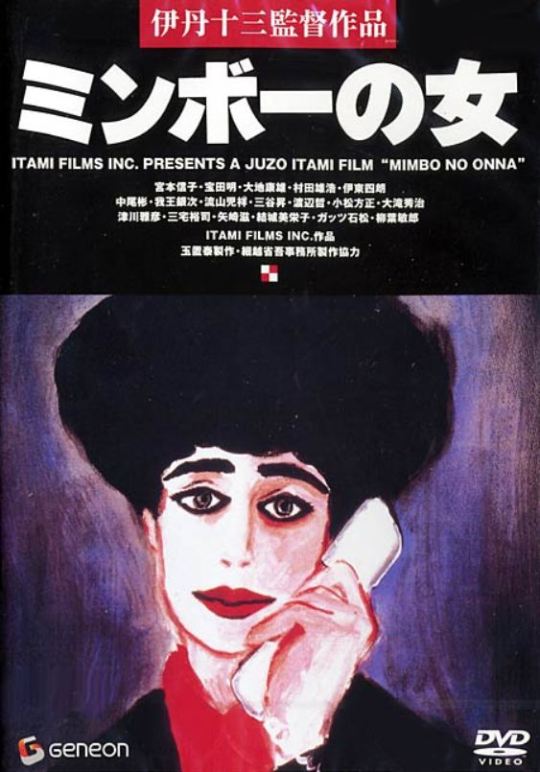
View On WordPress
#Akira Nakao#Akira Suzuki#Akira Takarada#Atsuko Nakamura#Hideji Ôtaki#Hiroshi Ohkôchi#Hosei Komatsu#Itami Films#Japan#Juzo Itami#Kôichi Ueda#Kitarô#Masahiko Urano#Mirei Asaoka#Noboru Mitani#Nobuko Miyamoto#Ren Urano#Seigo Hosogoe#Shô Ryûzanji#Shûshi Nakamura#Shirô Itô#Takehiro Murata#Teruo Shimizu#Tetsu Watanabe#TIFF 1992#Toho Company#Toshiyuki Honda#Toshizô Kudô#Yasuo Daichi#Yasushi Tamaoki
0 notes
Photo
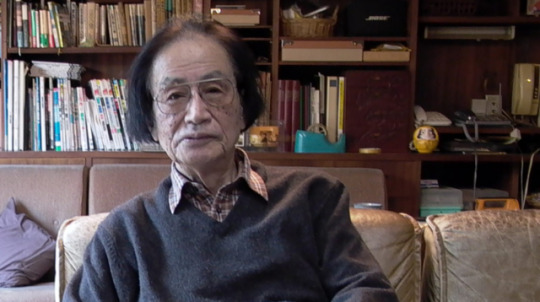

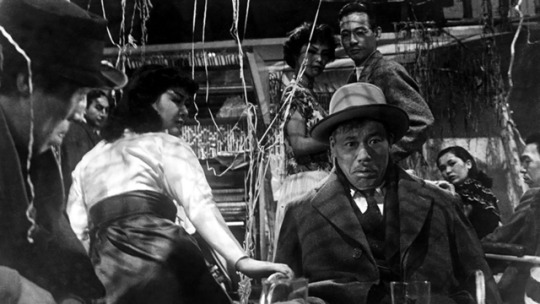
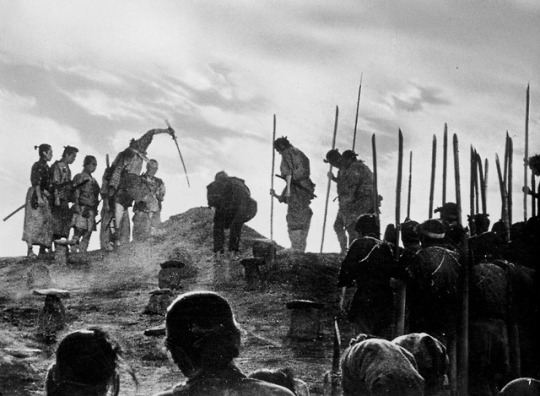
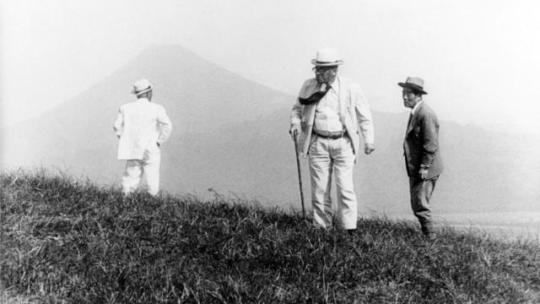
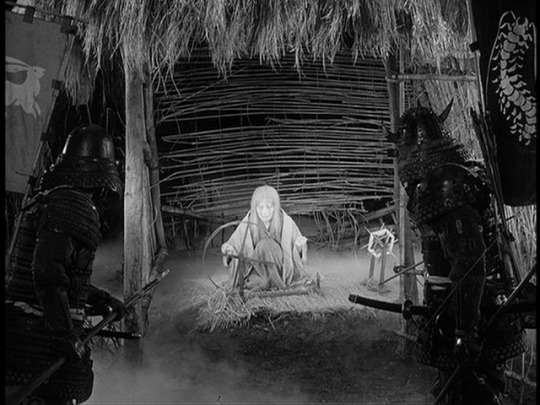
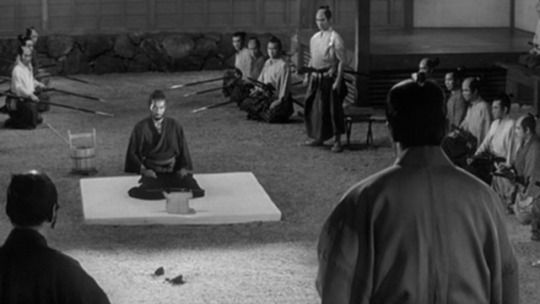
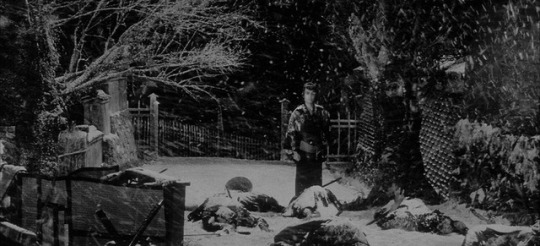
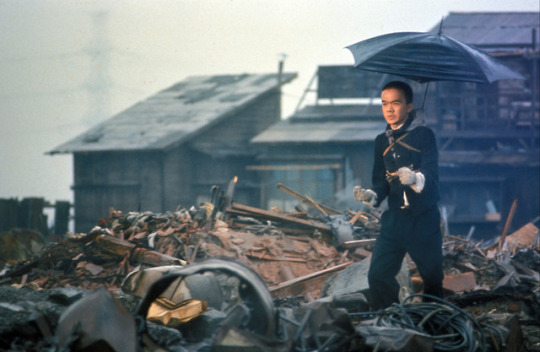
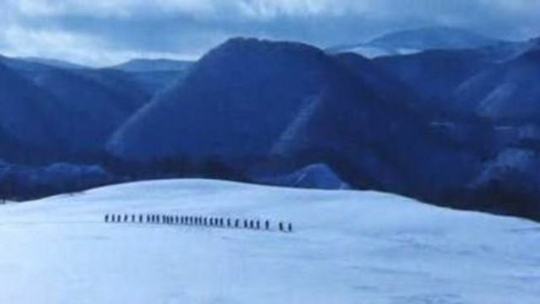
How tragic that man can never realize how beautiful life is until he is face to face with death.
Screenwriter Shinobu Hashimoto (April 18, 1918 -- July 19, 2018) was one of Akira Kurosawa’s least-known collaborators, if only because he was not part of the director’s photogenic actors. But Hashimoto was more than just a Kurosawa collaborator. The screenwriter was raised in the Japanese countryside and was discharged from military service in World War II because of tuberculosis -- forcing him to spend four years in a veterans’ hospital. A fellow patient one day handed Hashimoto a magazine on cinema and, poring through the contents, it was then Hashimoto decided to pursue a career in filmmaking. He sent a screenplay to Mansaku Itami (a major figure of 1930s Japanese cinema, but whose films have largely not been distributed to the West), who was so impressed that he became the young Hashimoto’s mentor until his death in 1946.
Rashômon was Hashimoto’s screenwriting debut (and what a hell of a debut). Over the next several decades, Hashimoto’s films -- regardless of the director or actors involved -- would explore humanity from its most altruistic to its most unconscionable moments of cruelty. Hashimoto retired in 1982, having been with Toho Company for almost the entirety of his career. He passed away at a hundred years old in July -- the last of Kurosawa’s regular screenwriters living, and arguably the dean of that entire group.
Nine of his films are pictured above (left-right, descending):
Rashômon (1950) -- directed by Akira Kurosawa; also starring Toshirô Mifune, Machiko Kyô, Masayuki Mori, Takashi Shimura, and Minoru Chiaki
Ikiru (1952) -- directed by Akira Kurosawa; also starring Takashi Shimura, Shin’ichi Himori, Haruo Tanaka, Minoru Chiaki, Miki Odagiri, and Bokuzen Hidari
Seven Samurai (1954) -- directed by Akira Kurosawa; also starring Toshirô Mifune, Takashi Shimura, Yoshio Inaba, Daisuke Katô, Seiji Miyaguchi, Minoru Chiaki, Isao Kimura, Yoshio Tsuchiya, and Bokuzen Hidari
I Live in Fear (1955) -- directed by Akira Kurosawa; also starring Toshirô Mifune, Takashi Shimura, and Minoru Chiaki
Throne of Blood (1957) -- directed by Akira Kurosawa; also starring Toshirô Mifune, Isuzu Yamada, Takashi Shimura, Akira Kubo, Hiroshi Tachikawa, and Minoru Chiaki
Harakiri (1963) -- directed by Masaki Kobayashi; also starring Tatsuya Nakadai, Rentarô Mikuni, Shima Iwashita, Akira Ishihama, and Yoshio Inaba
The Sword of Doom (1966) -- directed by Kihachi Okamoto; also starring Tatsuya Nakadai, Yûzô Kayama, Michiyo Aratama, and Toshirô Mifune
Dodes’ka-den (1970) -- directed by Akira Kurosawa; also starring Yoshitaka Zushi, Kin Sugai, Toshiyuki Tonomura, Shinsuke Minami, and Yûkô Kusunoki
Hakkodasan (1977) -- directed by Shirô Moritani; also starring Shôgo Shimada, Ken Takakura, Hideji Ôtaki, Kin'ya Kitaôji, Tetsurô Tanba, Rentarô Mikuni, Komaki Kurihara, Akira Hamada, Mariko Kaga, and Yûzô Kayama
#Shinobu Hashimoto#Rashomon#Ikiru#Seven Samurai#Throne of Blood#I Live in Fear#Harakiri#The Sword of Doom#Dodeskaden#Hakkodasan#Dodesukaden#Dodes'ka den#in memoriam
34 notes
·
View notes
Video
Mamo's impersonations (in order of appearance):
- Ken Shimura,
- Shingo Yanagisawa,
- Beat Takeshi,
- Sei Hiraizumi,
- Hideji Ôtaki.
42 notes
·
View notes
Text
The Funeral (1984)
The Funeral by #JuzoItami starring #NobukoMiyamoto and #TsutomuYamazaki, "laughs come naturally through the many odd and unpredictable experiences that arise",
JUZO ITAMI
Bil’s rating (out of 5): BBBB.5
Original Title: Osôshiki
Japan, 1984. Itami Productions, New Century Productions. Screenplay by Jûzô Itami. Cinematography by Yonezô Maeda. Produced by Seigo Hosogoe. Music by Jôji Yuasa. Production Design by Hiroshi Tokuda. Costume Design by Fumio Iwasaki. Film Editing by Akira Suzuki.
Juzo Itami, already established as an actor in the Japanese film…

View On WordPress
#Akio Kaneda#Akira Suzuki#Asao Sasano#Atsuyoshi Matsukidaira#Chikako Yuri#Chishû Ryû#Eriko Ohashi#Fumio Iwasaki#Gô Rijû#Go Toneatsu#Haruna Takase#Haruo Tanaka#Hideji Ôtaki#Hidekazu Nagae#Hideo Fukuhara#Hideo Nagai#Hikaru Nishikawa#Hiroko Futaba#Hiroko Seki#Hiroshi Tokuda#Hiroyuki Tsuchiyama#Hiroyuki Yamada#Ichirô Ohba#Ichirô Zaitsu#Ippei Souda#Isao Bitô#Itami Productions#Ittoku Kishibe#Japan#Jôji Yuasa
0 notes
Text
A Taxing Woman (1987)
A Taxing Woman by #JuzoItami starring #NobukoMiyamoto, "a bit too long and the story eventually becomes a mass of idiosyncratic back and forth about tax evidence without building to an exciting climax",
JUZO ITAMI
Bil’s rating (out of 5): BBB.5
Original Title: Marusa No Onna
Japan, 1987. New Century Producers, Itami Productions. Screenplay by Jûzô Itami. Cinematography by Yonezô Maeda. Produced by Seigo Hosogoe, Yasushi Tamaoki. Music by Toshiyuki Honda. Production Design by Shûshi Nakamura. Film Editing by Akira Suzuki.
The success of Juzo Itami’s first feature film as director, The Funeral,…

View On WordPress
#Akiko Hatakeyama#Akira Shioji#Akira Suzuki#Atsushi Yamamoto#Ben Ichikawa#Bengal#Bin Sasaki#Bsaku Satô#Eiichi Kikuchi#Eimei Esumi#Eitarô Ozawa#Gilyak Amagasaki#Hajime Asô#Hanbei Kawai#Hideaki Mikoshiba#Hideji Ôtaki#Hideo Murota#Hikaru Uchida#Hiroyuki Yamada#Isao Hashizume#Itami Productions#Jambo Sugita#Japan#Junko Ishida#Juzo Itami#Kaidô Yamazaki#Kaizô Hori#Kan Yanagiya#Katsuhiko Kobayashi#Kazumasa Takemoto
0 notes